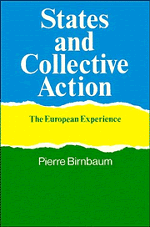Book contents
- Frontmatter
- Contents
- Acknowledgements
- Introduction
- 1 Mobilisation theory and the state: the missing element
- 2 States, free riders and collective movements
- 3 The state and mobilisation for war: the case of the French Revolution
- 4 Ideology, collective action and the state: Germany, England, France
- 5 Individual action, collective action and workers' strategy: the United States, Great Britain and France
- 6 The state versus corporatism: France and England
- 7 The Nazi collective movement against the Prussian state
- 8 Territorial and ethnic mobilisation in Scotland, Brittany and Catalonia
- 9 Nation, state and culture: the example of Zionism
- 10 The state, the police and the West Indians: collective movements in Great Britain
- Conclusion: the end of the state? From differentiation to dedifferentiation
- Notes
- Index
3 - The state and mobilisation for war: the case of the French Revolution
Published online by Cambridge University Press: 04 August 2010
- Frontmatter
- Contents
- Acknowledgements
- Introduction
- 1 Mobilisation theory and the state: the missing element
- 2 States, free riders and collective movements
- 3 The state and mobilisation for war: the case of the French Revolution
- 4 Ideology, collective action and the state: Germany, England, France
- 5 Individual action, collective action and workers' strategy: the United States, Great Britain and France
- 6 The state versus corporatism: France and England
- 7 The Nazi collective movement against the Prussian state
- 8 Territorial and ethnic mobilisation in Scotland, Brittany and Catalonia
- 9 Nation, state and culture: the example of Zionism
- 10 The state, the police and the West Indians: collective movements in Great Britain
- Conclusion: the end of the state? From differentiation to dedifferentiation
- Notes
- Index
Summary
The French Revolution brought about the rise of the nation, gave the people a role in the forefront of things and also did much to reinforce the power of the state. The claims that were' made about equality, together with assertions respecting the meaning of fraternity, served to establish a new kind of community, one resting upon the commitment of citizens. This was a community which had lost its organic character, so that the orders and the estates were shattered, the guilds disappeared and regional and provincial identities were worn away. Citizenship and universalism reflected one and the same shift; both of them bore witness to the emergence of a community of citizens who were from now on obliged to repudiate their peripheral allegiances. The construction of the state depends upon the creation in modern times of such a community of citizens. As Reinhard Bendix observes, ‘In the nation-state each citizen stands in a direct relation to the sovereign authority of the country in contrast with the medieval polity in which that direct relation is enjoyed only by the great men of the realm. Therefore, a core element of nation-building is the codification of the rights and duties of all adults who are classified as citizens.’ The passage from the ‘civil’ to the ‘civic’ implies that the state has become independent. Now, a crucial aspect of the formation of the state – as political and administrative locus – is the strengthening of a public force.
- Type
- Chapter
- Information
- States and Collective ActionThe European Experience, pp. 55 - 66Publisher: Cambridge University PressPrint publication year: 1988
- 2
- Cited by



